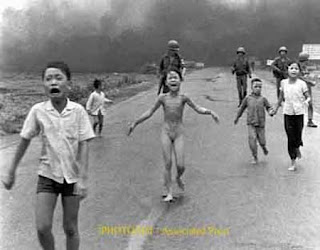A few South Vietnamese -- anywhere from veterans of the war to teachers to engineers -- were deemed dangerous and were sent to reeducation camps where they would confess to crimes they committed against Vietnam.Those citizens that were deteremined to be 'too dangerous' were placed in camps in Norther Vietnam where slave labor wasn't uncommon.
Tuesday, May 24, 2011
Some South Vietnamese who fought in the war and were mostly jobless afterward were forced, along with their families, into "land redevelopment projects" (New Economic Zones).
The conditions they were moved into were horrible and could be deemed unliveable.
Many thought of these New Economic Zones as places for 'internal exile'.
Monday, May 23, 2011
Because of the United State's extreme use of Agent Orange (more than 20 million gallons) to destroy the jungle-like terrain, Vietnam physically was left destroyed.Crops were also damaged, leaving the Vietnamese people with hard land to work on.Agent Orange has also been linked to many health problems, such as cancer.
There were many losses for the Vietnamese coutnry as a whole.Since the war took place in Vietnam, the US lost only those there fighting. That wasn't the same picture for the Vietnamese people. Not only was the army fighting but citizens fought just the same.Vietnam lost more than 1.1 million people, compared with the US's 58,261.
Friday, May 20, 2011
Works Cited
"History: After the Vietnam War." BBC. Web. 24 May 2011. <http://www.bbc.co.uk/schools/gcsebitesize/history/mwh/vietnam/afterthewarrev1.shtml>.
Karon, Tony. "Afghanistan: A Taliban Offensive Hopes to Repeat Vietcong's Tet Effect." Time Magazine. 10 May 2011. Web. 13 May 2011. <http://globalspin.blogs.time.com>.
Schmemann, Serge. "Looking Back at the Shame of the Vietnamese Left Behind." The New York Times. 16 Sept. 2007. Web. 19 Apr. 2011. <http://www.nytimes.com/2007/09/19/opinion/16sun4.html>.
Sitikoff, Harvard. "The Postwar Impact of Vietnam." Welcome to English « Department of English, College of LAS, University of Illinois. Web. 25 May 2011. <http://www.english.illinois.edu/maps/vietnam/postwar.htm>.
"The Aftermath of the War." Web.
"The Impact of War on Vietnam." History Learning Site. 2011. Web. 19 May 2011. <http://www.historylearningsite.co.uk/impact_war_vietnam.htm>.
"The Vietnam War and Its Aftermath." The New York Times. 19 Apr. 2000. Web.
"The Vietnam War and Its Impact - Vietnamese Veterans." Encyclopedia of New American Nation. Web. 17 May 2011. <http://www.americanforeignrelations.com/O-W/The-Vietnam-War-and-Its-Impact-Vietnamese-veterans.html>.
“Viet Nam: A Bloody Rite of Passage." Time Magazine 25 Apr. 1985. Time Magazine. Web. 13 May 2011. <http://www.time.com/time/printout/0,8816,966165,00.html>.
“Vietnam After 1975." Country Studies. Web. 24 May 2011. <http://www.country-studies.com/vietnam/vietnam-after-1975.html>.
"Vietnam War Casualties." Vietnam Gear. 2011. Web. 21 May 2011. <http://www.vietnamgear.com/casualties.aspx>.
Subscribe to:
Comments (Atom)




